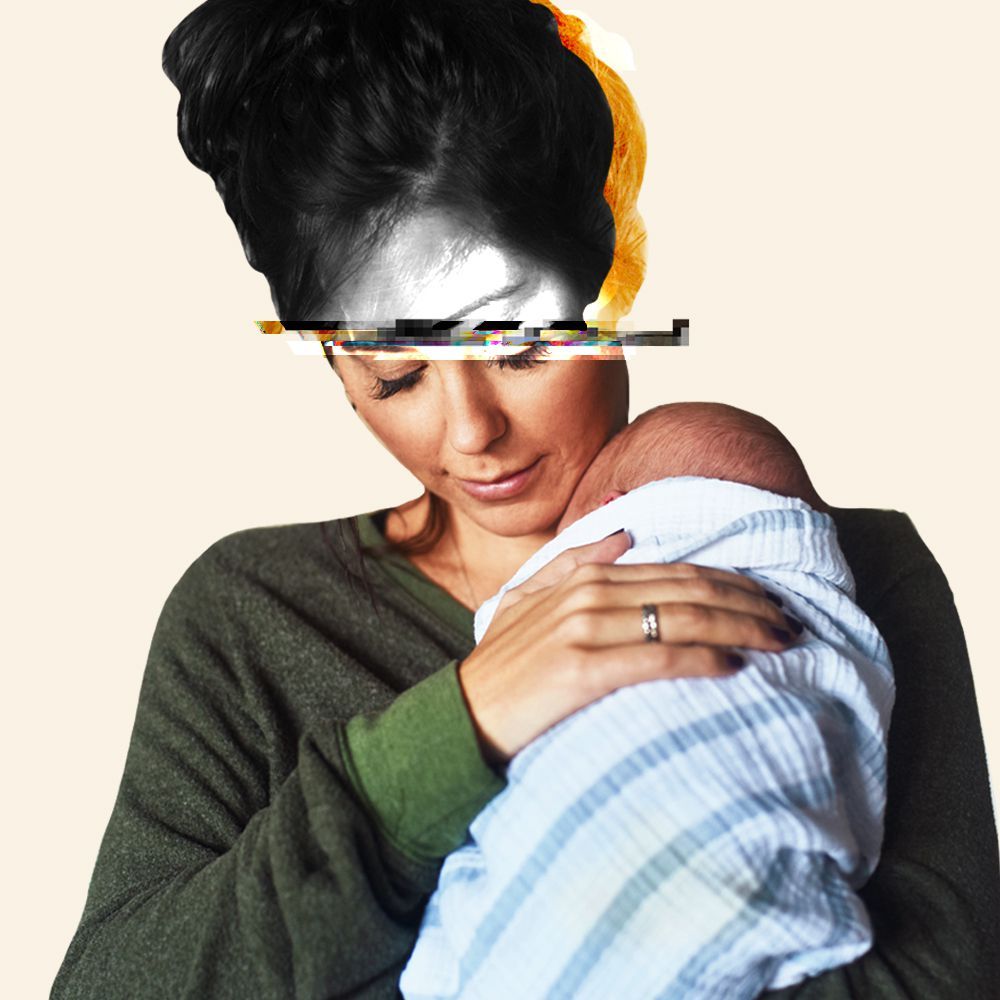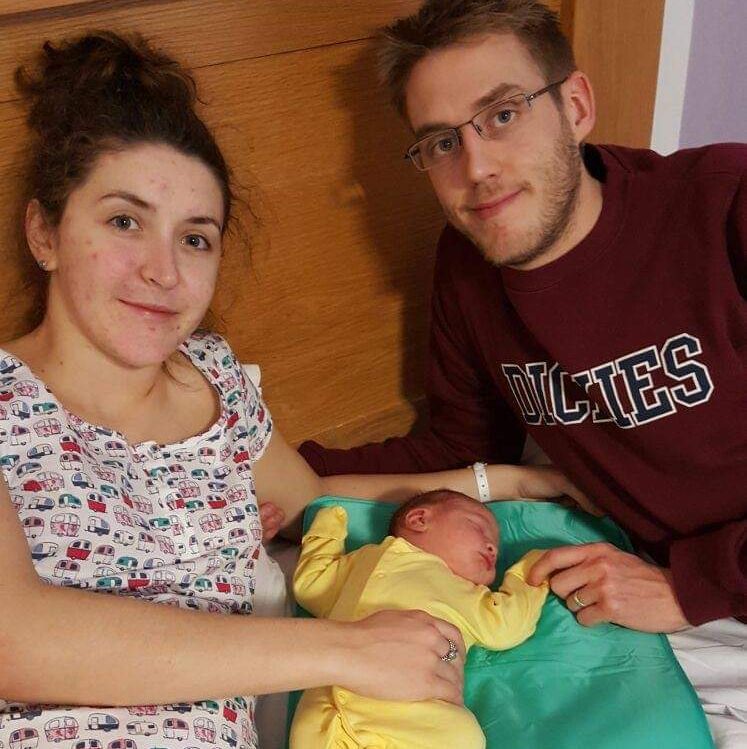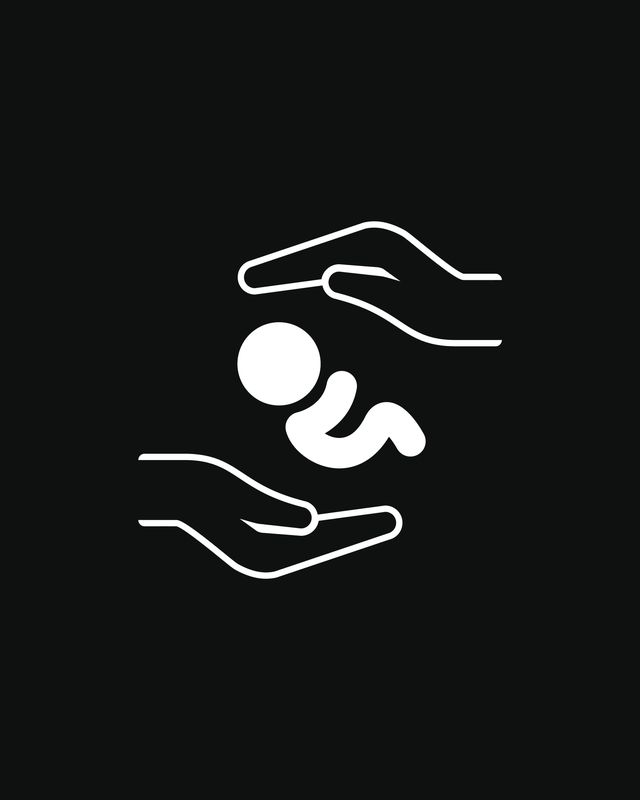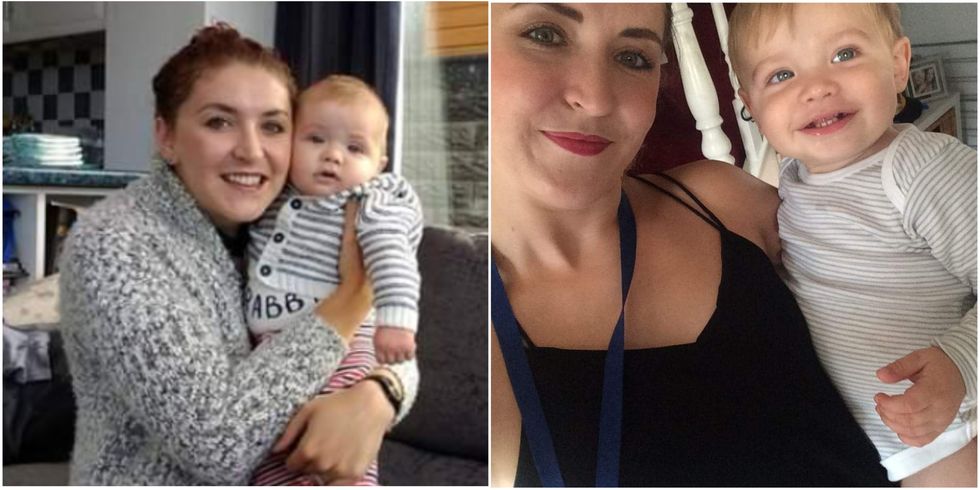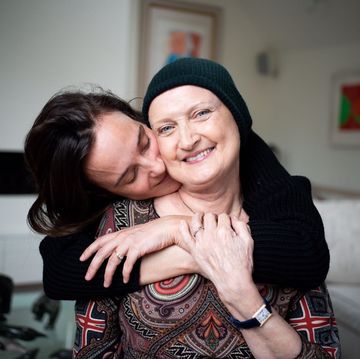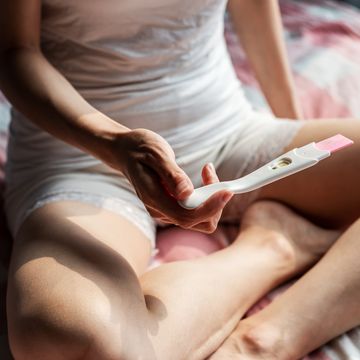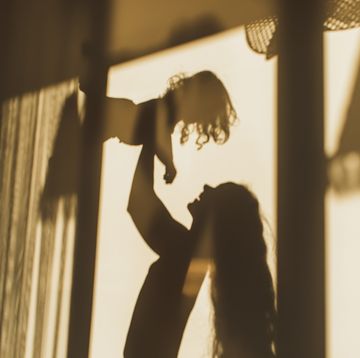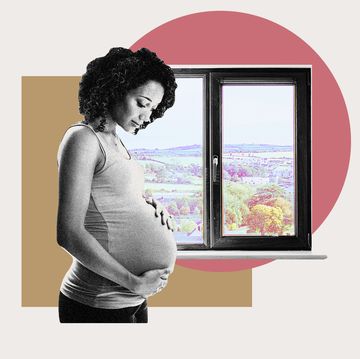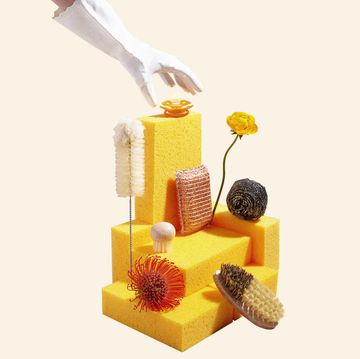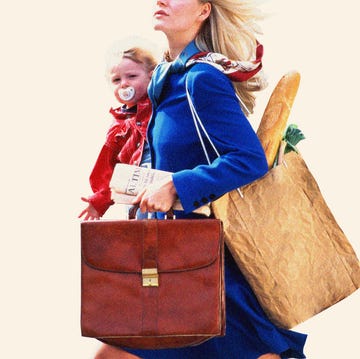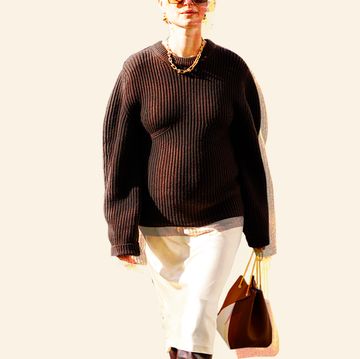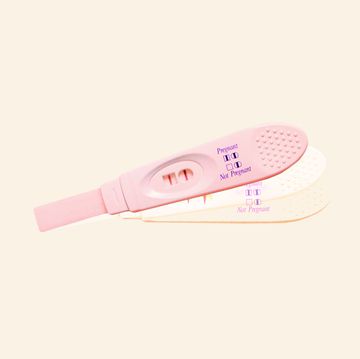This feature is part of ELLE's 'Modern Motherhood Series' - exploring the shifting role of 'mother' in society and the women choosing to do things differently.
Days after giving birth, Rachel Flynn wasn’t sleeping. For most new parents, bloodshot eyes and dazed expressions become the norm. Her baby, Finley, started losing weight and the midwife told Rachel to feed him every two hours. Yet even when she was free from the shackles of breastfeeding, she couldn’t relax. Instead, Rachel kept busy. She’d stay up all night, cleaning, online shopping, and buying Mother’s Day presents for the extended family.
‘My head would hit the pillow but my mind was whirling,’ says the now 26-year-old.
Amid the exhaustion, Rachel’s moods began to morph. One minute she was high, the next extremely low. She wasn’t eating. She’d talk to her mother-in-law, excitedly, before bursting into tears. Then, she started stripping the house: old photos, concert tickets, school yearbooks – anything personal from her past was dumped in the bin.
‘I was uncontrollable,’ she says. ‘I kept thinking: “I’m a mother now, things need to change. That’s my old life, I don't need any of that anymore”.’
Twelve days after she gave birth, Rachel was admitted to an acute psychiatric ward. No one could tell her what was going on (it was Saturday, no doctors arrived until Monday), and without her baby nearby, things soon took a turn for the worse. She started hallucinating. Spiders and snakes danced in front of her eyes.
‘I was so scared,’ she explains. ‘I’d given birth in the same wing of this hospital less than two weeks ago. I just thought: how have I ended up here?’
What is maternal mental illness?
Rachel was eventually diagnosed with postpartum psychosis (PP). A rare, but severe mental illness, it affects one or two in every 1,000 women soon after childbirth. Symptoms can be varied, from anxiety to hallucinations, delusions and loss of inhibitions.
While it’s more common in women who have bipolar disorder or a previous episode of psychosis, for roughly half of women PP is completely out of the blue. This was true for Rachel – she had no history of mental illness.
In fact, one in five women will experience mental illness during pregnancy or the year after giving birth. ‘Having a baby is a major life event,’ explains Rachel Boyd of Mind, a mental health charity. ‘Although it’s seen as a positive event, for some women this time can be a real struggle – you might find it difficult to cope.’
When this happens after you’ve had a baby, it’s typically called postnatal or postpartum mental health problems. Not only are you now responsible for a tiny person, you’re likely adjusting to other changes, such as lack of sleep, a shift in relationship dynamics or financial pressures.
It’s tough, and it’s not surprising that you might experience some kind of mental health issue after pregnancy (if you’re already experiencing symptoms, these can often worsen).
There are, however, some mental health problems which aredirectly linked to pregnancy and childbirth – these can include postnatal depression (PND), postnatal anxiety, postnatal obsessive compulsive disorder (OCD) and postpartum psychosis. If you’ve experienced a particularly difficult labour, an unplanned caesarean section or emergency treatment, you can also develop post-traumatic stress disorder (PTSD).
Symptoms vary from person to person. A woman suffering from postnatal depression might feel low and tearful, or hopeless about the future (10–15 per cent of new mothers experience this). On the sliding scale, PP is a manic or psychotic episode, and it comes on rapidly in the early postpartum days, escalating quickly. Women who suffer from PP, however, may not actually be depressed.
Men aren’t exempt, either. Studies suggest that around one in five men experience depression after their partner gives birth or during their pregnancy.
While the ‘baby blues’ is a well-recognised phenomenon, whereby new mothers feel emotional around three to 10 days after giving birth, it’s important to be aware it doesn’t (or shouldn’t) last long. You’ll feel a mixture of emotions post-birth, and that’s normal, but if your mood or symptoms continue for a couple of weeks, and are starting to impact your life, be aware that you may be experiencing a more serious mental health problem.
So, what next?
If you’re suffering, talking is key. Whether it’s your GP, midwife or health visitor, friend or family member, it’s important that you’re not alone and get the right support.
‘When I first felt off-key, I didn’t know where to turn,’ explains Nadene Marlborough, a communications manager at Imperial College Healthcare NHS Trust. After giving birth to her first daughter, Órla, last year, she started experiencing tinnitus, extreme tiredness, insomnia, racing thoughts, and eventually panic attacks.
‘I would hear horror stories in the news and think: “oh my goodness that’s going to be me,”’ explains the 37-year-old. ‘I’d convinced myself I was going crazy.’
In fact, she was suffering from postpartum anxiety – a condition less well-known than depression, but equally destabilising. She felt ‘mentally strong’ during her pregnancy, but when breastfeeding was harder than she’d expected she began to worry about other aspects of parenting – is teething going to end me? Will I survive the terrible twos?
Nadene plucked up the courage to speak to two friends. Both were parents, and reassured the new mum her experiences were more common than she thought. Talking to women who were at the same stage in motherhood became an essential lifeline.
‘When I was pregnant, I remember saying to my best friend, “I don’t need a group of mums to hang with, I have enough friends already”’ she explains. ‘I was wrong. I absolutely needed a mummy tribe. No one wants to hear about a partner’s promotion when your nipples are bleeding – I needed real women who say it how it is, who send you an ‘are you ok?’ text just when you need it.’
In Rachel’s case, she was moved from the acute psychiatric ward after five days to a Mother and Baby Unit (MBU) in Nottingham, which keep mothers and their new-borns together.
Postnatal mental illness can undermine a woman’s confidence and belief that she’s a good mother. At MBUs, specialist staff support mothers experiencing serious mental illness while allowing them to live alongside their babies. Here, Rachel was given the support she needed, including medication, and she was able to leave two months later.
Help is out there. Your GP or health visitor will be able to help you access things like counselling, or support groups to communicate with others experiencing similar things. Last week, a new BBC report highlighted an expanded network of NHS units making specialist support for new mothers across England. Nadene reached out to a variety of healthcare professionals – her local GP, family centre and wellbeing team, the latter providing effective Cognitive Behavioural Therapy (CBT) to help with her anxiety.
Delivery notes, care plans and preparation
On a practical level, there are several things you can do. If you’ve had a particularly traumatic labour, you can request your delivery notes. ‘There’s often a massive discrepancy between a woman’s memory of the birth and what the notes say,’ explains Sarah Murray, a Cambridge Independent Midwife. ‘But comparing both can help bridge the difference.’
After that, you can ring the hospital’s Patient Advice and Liaison Service (PALS), set up a meeting with a midwife and go through the notes together. ‘For some people, that’s enough,’ says Murray. ‘Sometimes people complain and the fact that their complaint is acknowledged or explained, feels like enough.’
While birth plans are important, Murray also suggests figuring out a care plan, which considers every alternative if things go wrong. ‘For example, if you get an emergency C-section, will you still have optimal cord clamping?’ asks Murray. ‘Do you know who’s going to be in the theatre with you? It takes away the element of surprise.’
Much like a school exam, says Murray, if you’ve done the revision, you’re better equipped to get your head around the questions – even the unexpected.
Nadene’s history of anxiety was mentioned once (by herself) in a healthcare assessment at the very start – and never discussed again. ‘I had never heard of post-natal anxiety,’ she explains. ‘If I had more knowledge, and coping skills introduced during pregnancy, I would have felt less scared.’ In a bid to help prepare women, she's now set up The Lost Trimester and shares her experiences of post-natal anxiety.
At the same time, mental illness can happen to anyone. Postpartum psychosis, for example, is a frightening, life-threatening illness that requires urgent treatment and is ‘nothing to be ashamed of,’ says Jessica Heron, Director of national charity Action on Postpartum Psychosis.
‘Women do not feel guilty for developing physical illnesses linked to childbirth,' she says. 'Why do they carry lifelong guilt for developing a severe mental illness?’
Nadene agrees, saying: ‘It’s time to re-phrase ‘mental health’ as just ‘health’ and move on so more women feel confident to speak up and find the right support.’
Life after giving birth
After leaving hospital, Rachel’s life didn’t slot back into place. At first, her mood was high – she fed Finley on time, the house was spotless. One week later, however, things dropped again.
‘I'd never felt so low in my life,’ she explains. ‘I would wake up to the sound of my baby crying next door, and I couldn't bring myself to get him. Sometimes I had to make myself sick in order to be able to relax again.’
A combination of medication, attending local parenting groups, psychologist meetings and chatting to other mothers helped. After six months, Rachel gradually began to feel better. She refuses to let PP define her and, as a representative for Action on Postpartum Psychosis, speaks openly about her experience. Two years later, she’s now studying psychology at university three days a week. After losing the ability to read and write in the hospital, it’s a seriously impressive feat.
‘Going through this has changed my life,’ she says. ‘I used to compare myself to the other mums. I used to think: “you lot are so good, why am I struggling?” But one of my friends said to me: “we’re all struggling, some are just better at hiding it.”
'And I liked that because it's the reality of many mums. We're all losing our shit, we just try and keep it together.’
For more information on postpartum psychosis, please contact Action on Postpartum Psychosis.

